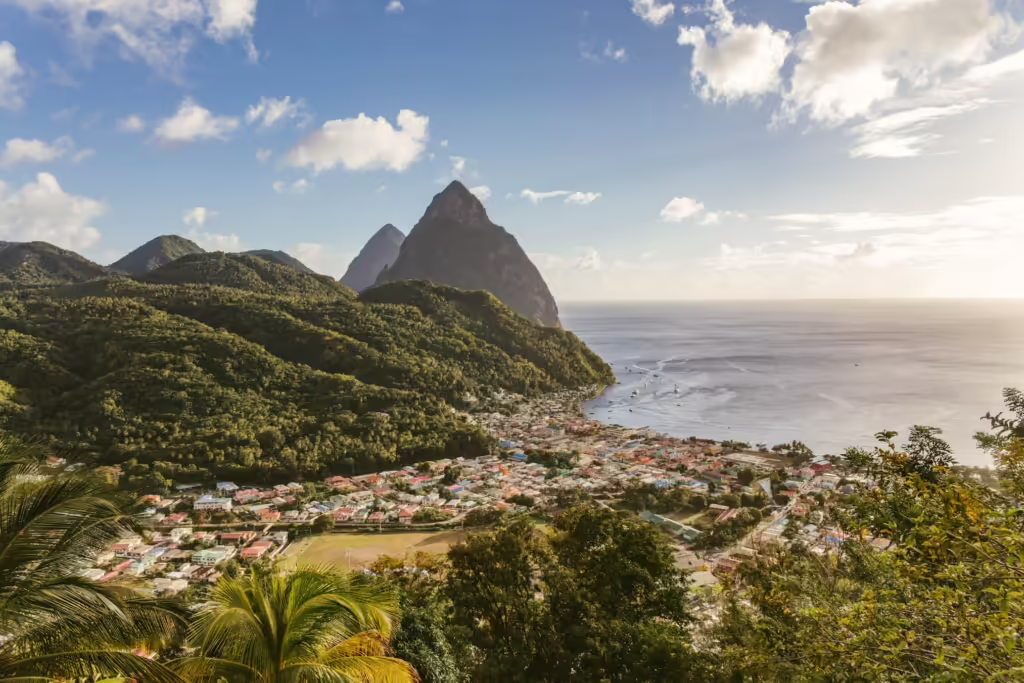Travel is an investment in your well-being—preventing burnout, reconnecting with yourself, strengthening bonds and creating memories with loved ones, and transforming lifelong dreams of experiencing different cultures and places into reality. Financial stress can quickly undermine these benefits if you don’t plan properly. This guide addresses the most common budgeting questions travelers ask when planning international trips. Please note, specific costs in dollars are not included for lodging as it can vary greatly within the same country and region of the world.
Disclosure: This post contains affiliate links, which means I may receive a small commission if you make a purchase using these links. This is at no additional cost to you. I only recommend products and services I use and trust as a travel advisor. The income from these affiliations helps support this blog and allows me to continue providing you with valuable travel planning advice. I appreciate your support!

Photo by Scott Graham on Unsplash
How to Create a Realistic Travel Budget That Includes As Much as Possible
Creating a comprehensive budget requires thorough research and an honest assessment of your financial situation:
• If you don’t know where to start, I recommend researching different tour companies’ itineraries and prices to establish benchmarks for typical costs. Do the same with flights. Not all flight classes, tours, and cruises offer the same inclusions. Check what is included in the price, what you may need to pay separately, and the level of accommodations. Pro tip: reading recommendations from a tour company about their tour can clue you into additional budget considerations you weren’t aware of.
• Track all potential expenses in categories:
o Pre-trip costs: passports, visas, vaccinations, travel gear, travel insurance. Pro tip: check with your insurance for provider coverage before scheduling an appointment with a travel clinic for vaccinations.
o Expensive lesson learned: In preparation for my trip to Botswana in 2024, I went to a travel clinic as my regular doctor recommended. I checked if my insurance covered any needed vaccines. Routine vaccines such as my tetanus booster were indeed covered, but unfortunately for me, only if an in-network provider like my doctor or pharmacy administered them. A $2,400 mistake I won’t be making again! 😮
o Transportation: flights, airport transfers, and other transportation such as ferries, trains, and local public transportation
o Accommodation: hotels, hostels, rental apartments, and homes. Note, many popular tourist destinations, including parts of Hawaii, Barcelona, and Seville are limiting the number of short-term rental property permits or eliminating them due to the housing crisis and rising rents.
o Food and drink: meals, snacks, bottled water, alcohol, specialty dining
o Activities: tours and excursions, attractions, entertainment, and classes
o Shopping: souvenirs, gifts, personal items
o Communication: SIM cards, Wi-Fi access, international plans
o Emergency fund: 15-20% buffer for unexpected costs or opportunities
Use spreadsheet templates or budgeting apps designed for travel to help ensure nothing is overlooked. Your most valuable tool will be destination-specific research from recent travelers who share real costs.

Photo of Santorini from above showing cliffside buildings and cruise ships on the water
How Much Should I Budget for a Trip to Popular Destinations?
Research your specific destinations, as costs can vary dramatically between cities and the time of year, even in the same country: Barcelona vs. Madrid vs. Seville, or Athens vs. Santorini vs. Crete vs. the Peloponnese

While costs vary based on travel style and specific locations, 5-star hotels are often similarly priced regardless of where in the world you are. On the opposite end of the spectrum, hostels can range from a few dollars in a large, shared room with communal bathrooms to $50/night for a private room. Few amenities are included with hostels; however, they many have communal kitchens, communal laundry machines for a fee, and breakfast for an additional cost.
How Much Spending Money Do I Need Per Day?
Daily spending requirements are highly dependent on your destination and travel style. Here is what to consider beyond accommodation:
Food costs per person:
• Budget: $15-30/day (street food, grocery stores, casual eateries)
• Mid-range: $50-75/day (mix of restaurants and self-catering)
• High-end: $100+/day (restaurants for most meals)
• Don’t forget to take into consideration drinks, both alcoholic and non-alcoholic
• Staying at a hotel with breakfast included can save you anywhere from a few dollars to $40 daily
Local transportation per person:
• Budget: $5-15/day (public transportation)
• Mid-range: $50-100/day (mix of public transport and occasional taxis)
• High-end: $200+/day (private transfers, frequent taxis)
• Ferries, trains, and flights between cities and countries: $50-250/day
Activities per person:
• Budget: $0-20/day (free activities, occasional paid attractions)
• Mid-range: $50-200/day (paid attractions, guided tours, classes)
• High-end: $250+/day (private tours, premium experiences)
Create a daily spending plan that includes these categories, including a buffer for spontaneous purchases or experiences and fluctuations in exchange rates when researching your destination.
A few of my favorite sites for transfers, tours, and experiences:
Project Expedition https://www.projectexpedition.com/?utm_source=elevatesignaturetravel-36046-brianna-65205&utm_medium=referral&utm_campaign=tagent,
Context Tours https://www.contexttravel.com/?ref=CHANDLER2
Get Your Guide https://www.getyourguide.com?partner_id=JFTE6DB&cmp=share_to_earn
For specific destinations and exclusive luxury experiences, I work with a variety of destination management companies and other partners.
What’s the Cheapest Time to Visit Popular Destinations?
Strategic timing can save 10-30% on your total trip cost:
Europe:
• Shoulder seasons: April-May and September-October
• Off-season: November-March (excluding Christmas/New Year)
• Greek Islands close September/October-May (except Santorini)
• Much of the Amalfi Coast, Italy closes October-April/May

Southeast Asia:
• Shoulder seasons: May-June and September-October
• Off-season: During monsoon seasons (varies by country)

Caribbean:
• Shoulder seasons: May and November
• Off-season: June-October (hurricane season)

Australia/New Zealand:
• Shoulder seasons: Spring (Sept-Nov) and Fall (Mar-May)
• Off-season: Winter (June-August)

Central America:
• Shoulder seasons: May-June and November
• Off-season: July-October (rainy season)

South America:
• Shoulder seasons: March-May and September-November
• Off-season: Varies by region (December-February is the rainy season in Andean regions, while it’s the high season in Southern regions like Argentina and Chile)
• The Inca trail to Machu Picchu is closed in February for maintenance and due to the rainy season. Other trails to Machu Picchu and the site itself are open year-round.

Northern Africa (Morocco, Egypt, Tunisia):
• Shoulder seasons: March-May and October-November
• Off-season: Summer months (June-September) when temperatures are extremely high. Note: some tour operators suspend tours during July and August

East Africa (Kenya, Tanzania, Uganda, Rwanda):
• Shoulder seasons: October-November and March-May
• Off-season: April-May (long rainy season) and November (short rainy season)
• Note: While these are budget-friendly times, wildlife viewing may be affected during heavy rains. However, bird watching is excellent, and safari crowds are minimal.

Southern Africa (South Africa, Namibia, Botswana, Zambia, Zimbabwe):
• Shoulder seasons: April-May and September-October
• Off-season: November-March (rainy season, though excellent for bird watching and lush landscapes)
• Note: Victoria Falls (Zambia/Zimbabwe) is at its most spectacular from March to May after the rainy season, while wildlife viewing is best during the dry season (June to October) when animals gather around water sources.
• Note: The Okavango Delta, Botswana, is at its most popular time during the flood season from June to September.

Research reveals that the best value periods differ by destination. Remember that “off-season” exists for a reason—sometimes weather conditions may impact your experience, so balance savings against potential limitations.

How Do I Save Money on Flights?
Flight costs often represent the largest single expense for international travel:
• Optimal booking windows: For international flights, book off-season travel 3-6 months in advance (studies show 4 months ahead is often the sweet spot), and 6-11 months in advance for holiday and summer travel.
• Best booking days: The old advice about the best days of the week to book is outdated and no longer accurate. Instead, use price comparison tools with flexible date options. Make sure you are comparing the same fare classes: refundable/changeable, seat selection included, checked bag included, etc.
• Search strategies:
o Set price alerts on multiple platforms (Google Flights, Skyscanner, Hopper)
o Consider nearby departure and arrival airports
o Check one-way flight combinations vs. round-trip
o Look for error fares and flash sales through services like Scott’s Cheap Flights
• Loyalty strategies: Focus on flexible points currencies rather than single airline miles
International flight costs vary by region, season, departure city, and arrival city. For an economy ticket to Europe, expect to pay $1,200- $2,000 round-trip, depending on the season, but strategic booking and flexible travel dates can reduce this by 20-30%.
If you have points or miles but don’t know what they are worth or the best way to use them; Point.me is a great place to check for the best options.
Are All-Inclusive Resorts Worth the Money?
All-inclusive resorts offer predictable budgeting but aren’t always the best value:
When an all-inclusive makes financial sense:
• Destinations where food and activities are expensive (Maldives, parts of the Caribbean)
• When traveling with children who eat frequently and aren’t adventurous eaters
• When your primary goal is relaxation rather than exploration
• During short stays where convenience outweighs exploration
When an all-inclusive doesn’t make financial sense:
• Destinations with excellent affordable local food
• For travelers who explore extensively during the day
• For light eaters or drinkers or foodies (you subsidize heavy consumers, and they generally aren’t known for their food)
• For longer stays where you’ll want variety
Calculate the true per-day cost of all-inclusive vs. paying à la carte based on your actual habits. An average all-inclusive might cost $300-600 per person per night, while independent arrangements might range from $150-350, depending on your consumption patterns and location.
What Hidden Costs Should I Be Aware of When Traveling Internationally?
Many travelers are blindsided by these overlooked expenses:
• Foreign transaction fees: Most credit cards charge 3-4% on every purchase
• ATM withdrawal fees: Both your bank and the local bank may charge ($5-10 per withdrawal)
• Dynamic currency conversion: Always choose to pay in local currency to avoid significant markups and poor conversion rates by local banks; currency exchange rates can change between the time you book a hotel or experience and the time your card is charged during travel
• Departure taxes: Some countries collect $20-50 when leaving
• Resort fees: Mandatory charges of $50-100/night are not included in the advertised hotel rates, although new legislation may change this
• Tourist taxes: Many cities charge per-person, per-night fees (€1-7 in Europe). Venice implemented this during the high season for day-trip visitors. Register before arrival and have your receipt ready to show the police if stopped to avoid fines. Greece and Iceland are two other popular countries with tourist taxes at hotels.
• Visa on arrival fees: $20-100 depending on the country
• Transportation surcharges: Airport taxis often cost 2-3x standard rates
• Rental vehicle parking: Large cities with limited parking and resorts charge as much as $50-75/day for parking
• Rental vehicle insurance: Some countries require additional insurance
• Baggage fees, overhead bin space, seat selection: Even on international flights with some carriers (read the rules of the fare class closely)
• Cell phone roaming: Data usage without a plan can be extremely costly
• Exchanging currency after leaving: In some cases, you may not be able to exchange currency anywhere except in the country. I did not know this before visiting Albania, I wrongly assumed I could exchange my extra cash when I arrived in Greece. I have approximately $250 worth of Albanian money I can’t exchange. A sign I need to return?
• Medical costs: Without travel insurance, many clinics and hospitals require full payment before you leave the clinic or hospital, or a deposit at the beginning of your stay. Contrary to what you may have heard, free healthcare in other countries is only free for residents, not tourists, although it may still be less expensive than what you would pay at home.
These hidden costs can add 15-25% to your overall trip budget if not properly accounted for.
Is It Cheaper to Book Hotels Directly or Through Third-Party Sites?
The answer depends on several factors:
Booking directly advantages:
• Price-match guarantees often with 10-25% extra off if you find a lower price
• Loyalty points and status benefits
• Better room assignments
• More flexible cancellation policies
• Direct customer service if issues arise
Third-party site advantages:
• Package deals can save 15-25% when combining flights and hotels
• Last-minute deals sometimes offer significant discounts
• Rewards programs across multiple hotel brands
• More comprehensive search functionality
Best strategy: Research on aggregator sites, then check the hotel’s direct website before booking. Many hotels now guarantee the lowest rates when booking directly, with added perks that third-party sites can’t match.
Third-party site disadvantages:
• Limited to no customer service assistance from both the third-party site and the airlines and hotels
• Inventory is not live; you may book a room or vehicle that isn’t available. You may not learn this until you arrive
• If a hotel is over-booked, third-party bookings are the first to be sent to other hotels if they don’t have room
Pro tip: Consider airline-affiliated vacation sites like Delta Vacations, AA Vacations, United Vacations, and Southwest Vacations for flights and hotel packages.

How Far in Advance Should I Book to Get the Best Prices?
Optimal booking timelines vary by service:
Flights:
• Domestic: 3-6 months ahead
• International: 3-11 months ahead
• Holiday periods and high season: 6-11 months ahead
Hotels:
• High season and holiday periods: 6-11 months ahead
• Shoulder/low season: 2-6 months ahead
• Major events/festivals: 6-12 months or more ahead
Rental cars:
• High season: 5-6 months ahead
• Low season: 1-3 months ahead (rates rarely drop closer to date)
Tours and attractions:
• Popular/limited availability: 3-6 months ahead
Note: Some popular museums and attractions, such as the Eiffel Tower in Paris and the Anne Frank Museum in Amsterdam, release tickets once a week on a set day and time, for 6 entrance weeks from the release date. They sell out quickly, and once they are sold, you will not be able to purchase last-minute tickets.
• Standard tours: 2-4 weeks ahead
Note: Booking early is always recommended, especially if it’s a popular destination, high season, or there are more than two people in the group. The most desirable tour times are often booked in advance.
Trains and ferries:
• Popular destinations and high season: 3-6 months ahead
• Low season: 1-3 months ahead
A staggered booking approach often yields the best overall value, with flights secured first, then accommodation, and finally destination services.

What’s the Best Way to Handle Money Abroad to Avoid Fees?
Strategic money management can save 5-10% on your total trip cost:
Before your trip:
• Open a no-foreign-transaction-fee credit card (saves 3-5% on every purchase)
• Get a checking account that reimburses ATM fees worldwide
• Order a small amount of local currency from AAA (no fees)
• Download apps like XE Currency for real-time conversion rates
During your trip:
• Withdraw larger amounts less frequently from ATMs to minimize per-transaction fees
• Always choose the local currency option when using credit cards or ATMs
• Use credit cards for larger purchases, and cash for small transactions
• Keep funds in separate locations for security
Avoid:
• Airport currency exchange counters (20-30% worse rates)
• Traveler’s checks (outdated and difficult to use)
• Dynamic currency conversion (adds 5-10% to purchases)
• American Express (many small businesses do not accept Am Ex due to increased fees)
Most travelers can save $100-300 per week through smart currency management, depending on spending levels.
Points and Miles: Reality vs. Expectations
While using points and miles can be valuable, the reality differs from common perceptions:
• Advanced planning required: Redemptions for premium cabins or popular destinations often need 10-11 months of advanced booking.
• Devaluation is constant: Loyalty programs regularly increase point requirements for redemptions by 10-20% annually.
• Availability constraints: Award seats and rooms are limited, especially during peak periods.
• Hidden costs: Taxes and fees can still amount to $100-400/per person even on “free” flights.
• Opportunity cost: Points earned through spending could alternatively be 2-3% cash back.
Successful points strategies require flexibility, diversification across programs, and realistic expectations about actual savings. For most travelers, the best approach combines selective point use with traditional cash bookings.
Long-Term Financial Planning for Travel
For those who prioritize travel as a lifestyle:
• Set up automatic transfers to a dedicated travel fund in a HYSA
• Consider travel-focused credit cards with significant welcome bonuses
• Research annual or semi-annual “travel fund boosts” like selling unused items
• Create a “travel opportunity fund” separate from your planned trip budgets
• Always purchase travel insurance that covers trip interruption, cancellation, and emergency medical needs

Final Thoughts: Investing in Memorable Experiences
Smart financial planning transforms travel from a rare luxury to a sustainable part of your lifestyle. Remember that proper financial planning doesn’t just save money, it reduces stress and allows you to fully immerse yourself in the experience rather than worrying about costs during your journey.
Understanding the true cost of travel isn’t about limiting your experiences but about making informed choices that maximize your enjoyment while respecting your financial boundaries.
Bonus: Research shows that travel planning and anticipation for your upcoming trip have the same health benefits as the vacation itself.
Stay tuned for upcoming posts about the importance of travel insurance, and additional tips and nuances to consider when budgeting and planning your trip.
Need help planning your next adventure? Contact me for to set up your complimentary discovery call to start planning! Love to DIY your vacations but want a professional to review your itinerary so you don’t miss anything? I offer “pick my brain” sessions for travelers who don’t want full planning services. Contact Brianna at Elevate Signature Travel
Want to receive my travel newsletter? Sign up to get weekly travel tips, travel news and updates, learn about spotlight destinations and experiences, and hear about my travel. Get Brianna’s travel newsletter!
